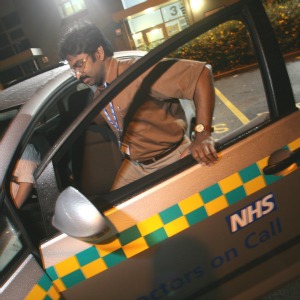Out-of-hours GPs are keeping hundreds of thousands of patients out of A&E

Exclusive GPs working all hours of the day and night are keeping hundreds of thousands of patients out of A&E departments, with just 5.6% of contacts made to GP out of hours being sent on to hospital as an emergency.
Analysis of data from eight out-of-hours providers by Urgent Health UK, who represent around half of GP urgent care providers, found that out of roughly one million patients seen in a 12-month period, just 74,334 were referred to A&E or 999.
Scaled up to the total population of England this amounts to 6.3 million calls, with 4.3m patients being kept in the community and just 370,000 referred to emergency or ambulance services.
It comes after Prime Minister Theresa May provoked the ire of the profession by ordering GPs to open their doors seven days a week, telling national newspapers that practices were blame for the crisis because they were not opening during evenings and weekends.
But the Urgent Health UK figures show across eight providers, with a total population of 8 million patients:
- 65% of contacts were seen in primary care, with 23% being given information only, and 2.5% being referred to community services.
- Providers received 118 calls for every 1,000 patients in their patch, of those calls, over 80 were received from NHS 111, 29 were direct from patients and 9 were bounced back from A&E.
- 45% of patients were dealt with over the phone, 42% of patients were seen in a treatment centre and 12% received a home visit
Out-of-hours leaders said recognition of their track record in keeping patients in the community was important when the NHS commissioned services in future.
They added that since the introduction of NHS 111 there has been a decrease in calls reaching out-of-hours, but this was countered by ‘increased clinical complexity’ and flat-line funding creating workforce pressures.
Chair of Urgent Health UK, Dr Simon Abrams, told Pulse: ‘The pressure felt on emergency services over the winter period has been well documented, but it is important attention is also focused on services such as out-of-hours, and that they are given recognition for their track record at reducing pressure on the acute system.’
It comes as a Pulse investigation last month found changing working patterns and national GP shortages have out-of-hours services running on a knife edge – with providers feeling they had been ‘airbrushed’ out of NHS England’s thinking.
One in 10 areas said there were occasions in 2016 where they had been forced to close centres or run shifts with no GP cover because of workforce shortages.
Last month Department of Health ministers admitted they had no idea how many GP patients attended A&E because a timely appopintment was not available.
GP leaders have repeatedly urged the Government to focus on sufficiently funding urgent out-of-hours services before rolling out seven-day routine services – a Conservative Party manifesto commitment in 2015.
NHS England said it was reviewing the workforce data it collects to better understand the pressures on the urgent care system, a spokesperson told Pulse: ‘We recognise and appreciate the vital urgent care delivered in and out of hours by primary care staff.’









